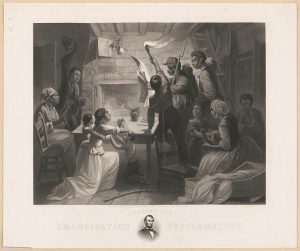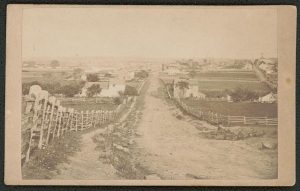Perceptions of Emancipation in Gettysburg, Part Two
ECW welcomes back guest author Jon Tracey
Part Two of a series (Part One)

As noted in Part One, Gettysburg was a deeply divided community on the topic of emancipation. Early in the war, support of the controversial topic and preliminary Emancipation Proclamation was often outweighed by opposition. On January 1st, 1863, the Proclamation came into effect, but the war of words continued. The Democrat Gettysburg Compiler, headed by the controversial Henry J. Stahle, vehemently opposed the action, slinging vitriol at Republican-leaning neighbors such as the Adams Sentinel.
Though the Emancipation Proclamation exempted border states such as Maryland who had not seceded, it went further than the preliminary proclamation did in other respects. It allowed the enlistment of African American men into segregated units and, importantly, it moved beyond calling emancipation merely a necessity and called it justice.[1] As the Proclamation came into effect, Democrat’s hopes of delay or repeal were dashed. Instead, they turned to criticism of the Proclamation’s effects – or the lack of any. The spring elections in 1863 served as a chance for voters to voice either their pleasure or displeasure for the Proclamation. The Compiler stirred local Democrats to oppose the “Black-Republican-Abolition party” and “convince the Abolitionists that the people of old Adams are still for the Constitution as it is and the Union as it was.”[2] Similarly, it criticized earlier Republican claims that volunteers would surge with news of Emancipation, and when they did not Stahle wrote that “it is high time our countrymen should see the hypocrisy of Abolitionism,” claiming that radicals did not have the bravery to fight for the cause themselves.[3] Finally, the Compiler often wrote that the Proclamation had no effect on the African American populations, claiming, “the negroes still remain quietly on the southern plantations…[and] the negroes within our lines show no passionate eagerness to fight.”[4] Returning to highly religious language, the Compiler called abolitionists “prophets of Baal” and pointed out that no holy luck had been granted to the nation; “The proclamation was issued- the bull against the comet has gone forth- and lo! as far as human discernment can penetrate, Heaven has not smiled upon their counsels.”[5] Through these claims of failure, Democrats hoped to convince their townspeople that Lincoln was wrong.
However, the tide of public opinion was slowly shifting. Gettysburg residents read article after article of Northern states supporting the measure, including a small clipping that the New York state Senate declared the Emancipation Proclamation “justifiable as a war measure and merits the support of all loyal people.”[6] That January, the Sentinel praised Lincoln abundantly, calling the Proclamation “the downfall of slavery in the United States…a war measure that will add to our strength.”[7] Though still relying on the necessity of the effort for military success, it edged towards language of freedom. With pride, the Sentinel printed the numbers of slaves freed from each state in rebellion, reaching a total of just over three million.[8] Criticizing Stahle and the Compiler, the Sentinel called his claims of being a Unionist false, and as a foreshadowing of allegations to come suggested he “exhibit some better evidence of sincerity of devotion to the Government and the Union- lest he might be “a spy in the camp.’”[9]

As the war continued, the Adams Sentinel gained more support in the local community despite the tense opposition and rhetoric of the Gettysburg Compiler. Many citizens of Gettysburg were continuing to think deeply about the issue of emancipation on their doorstep. As minds began to change, the small town of Gettysburg moved slowly but steadily toward the days that would enshrine it permanently in the history of the United States – July 1-3, 1863.
To be continued…
[1] McPherson, 563-564.
[2] “The Spring Elections,” Gettysburg Compiler, March 9, 1863.
[3] Gettysburg Compiler, January 12, 1863.
[4] “What it Has Done,” Gettysburg Compiler, March 30, 1863.
[5] Gettysburg Compiler, February 23, 1863.
[6] The Adams Sentinel, February 10, 1863.
[7] “The Proclamation,” The Adams Sentinel, January 6, 1863.
[8] “Number of Slaves of Rebels Declared Free by the Proclamation of the President,” The Adams Sentinel, January 20, 1863.
[9] The Adams Sentinel, February 24, 1863.
Jon – Scholarly reminder of the historian’s adage, “because people are complex, history is complex.” Greg Coco told me once that Gettysburg townspeople tended to be very patriotic, while small farmers living on the outskirts sometimes leaned anti-government. -Troy Harman